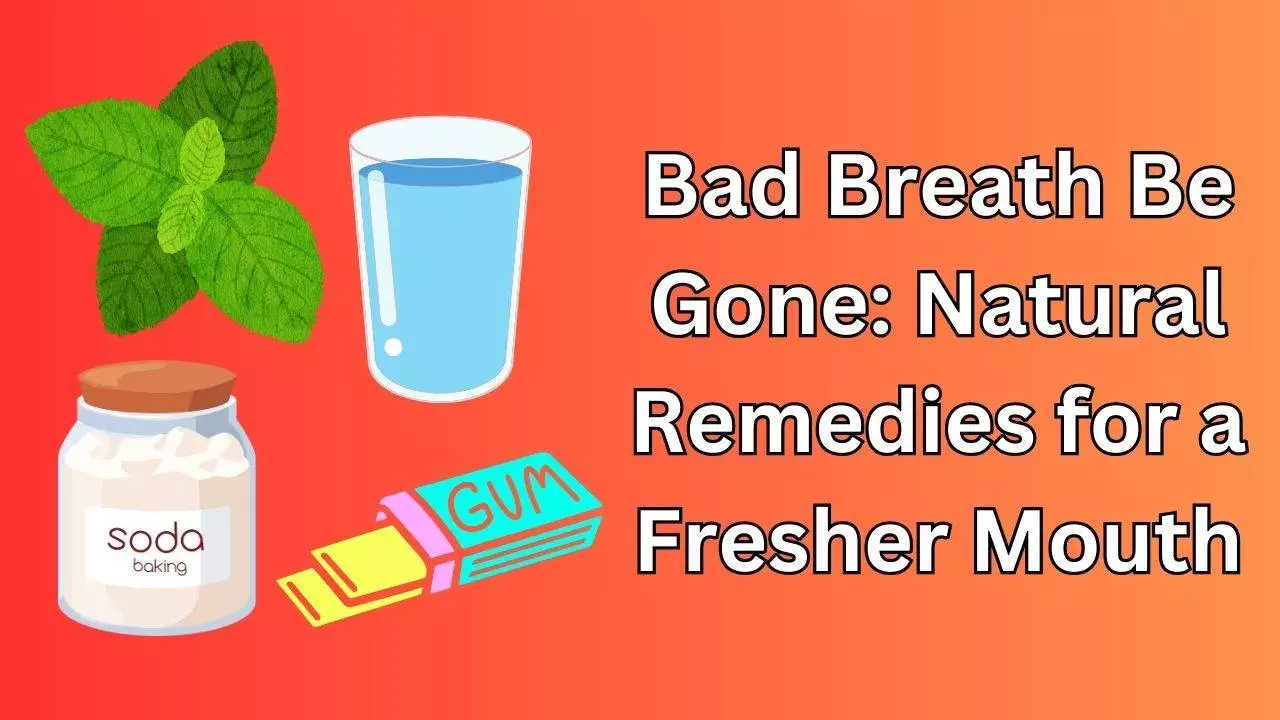
- The Importance of Oral Hygiene in Preventing Bad Breath
- Natural Remedies for Bad Breath: A Comprehensive Guide
- The Benefits of Drinking Plenty of Water for Fresher Breath
- The Role of Probiotics in Maintaining Oral Health
- The Power of Mint: Using Herbs to Freshen Breath
- The Benefits of Oil Pulling for a Cleaner Mouth
- The Role of Baking Soda in Neutralizing Odors
- The Benefits of Chewing Sugar-Free Gum for Fresher Breath
- The Importance of a Balanced Diet in Preventing Bad Breath
- Incorporating Natural Remedies into Your Oral Care Routine
Bad breath, also known as halitosis, is a common condition that affects many people. It is characterized by an unpleasant odor coming from the mouth. The causes of bad breath can vary, but they are often related to poor oral hygiene, certain foods, and underlying health conditions.
One of the most common causes of bad breath is poor oral hygiene. When we don’t brush and floss our teeth regularly, food particles can get stuck in between our teeth and gums, leading to the growth of bacteria. These bacteria produce sulfur compounds that give off a foul odor.
Another common cause of bad breath is certain foods and drinks. Foods like garlic and onions contain sulfur compounds that can be absorbed into the bloodstream and then exhaled through the lungs, causing bad breath. Additionally, consuming sugary foods and drinks can contribute to bad breath as they provide a breeding ground for bacteria in the mouth.
The Importance of Oral Hygiene in Preventing Bad Breath
Maintaining good oral hygiene is crucial in preventing bad breath. Brushing and flossing your teeth regularly helps remove food particles and plaque from your teeth and gums, reducing the risk of bacterial growth.
When brushing your teeth, it’s important to use the correct technique. Use a soft-bristled toothbrush and fluoride toothpaste. Brush your teeth for at least two minutes, making sure to brush all surfaces of your teeth, including the front, back, and chewing surfaces. Don’t forget to brush your tongue as well, as it can harbor bacteria that contribute to bad breath.
Flossing is also an essential part of oral hygiene. It helps remove plaque and food particles from between your teeth and along the gumline, where a toothbrush can’t reach. To floss properly, use about 18 inches of dental floss and wrap it around your middle fingers. Gently slide the floss between your teeth, making a C shape around each tooth and moving it up and down to remove any debris.
In addition to brushing and flossing, using a mouthwash can also help freshen your breath. Mouthwash contains antibacterial agents that can kill the bacteria in your mouth and temporarily mask bad breath. However, it’s important to note that mouthwash is not a substitute for brushing and flossing, but rather an additional step in your oral hygiene routine.
Natural Remedies for Bad Breath: A Comprehensive Guide
While maintaining good oral hygiene is essential in preventing bad breath, there are also natural remedies that can help freshen your breath. These remedies are often more gentle on the mouth and can provide additional benefits for oral health.
One natural remedy for bad breath is the use of essential oils. Essential oils like peppermint, tea tree, and eucalyptus have antibacterial properties that can help kill the bacteria in your mouth that cause bad breath. You can add a few drops of these oils to water and use it as a mouthwash or mix them with a carrier oil like coconut oil and swish it around in your mouth for a few minutes before spitting it out.
Herbal remedies can also be effective in combating bad breath. Herbs like parsley, mint, and cloves have natural deodorizing properties that can help freshen your breath. Chewing on a sprig of parsley or mint leaves after a meal can help neutralize odors in your mouth. Cloves can be used by chewing on them or making a tea with them and using it as a mouth rinse.
There are also several home remedies that can help alleviate bad breath. One popular home remedy is apple cider vinegar. Gargling with diluted apple cider vinegar can help kill the bacteria in your mouth and neutralize odors. Another home remedy is baking soda. Mixing baking soda with water to create a paste and brushing your teeth with it can help neutralize odors and remove plaque.
The Benefits of Drinking Plenty of Water for Fresher Breath
Drinking plenty of water throughout the day is not only important for overall health but also for preventing bad breath. Water helps keep your mouth hydrated and stimulates the production of saliva, which is essential in maintaining good oral health.
When your mouth is dry, it creates an environment that is favorable for the growth of bacteria. These bacteria can produce sulfur compounds that cause bad breath. Drinking water helps wash away food particles and bacteria from your mouth, reducing the risk of bad breath.
Staying hydrated also helps prevent dry mouth, a condition where there is a lack of saliva production. Saliva plays a crucial role in maintaining oral health as it helps wash away food particles, neutralize acids in the mouth, and prevent the growth of bacteria. By drinking enough water, you can ensure that your body produces an adequate amount of saliva to keep your mouth healthy and fresh.
The Role of Probiotics in Maintaining Oral Health
Probiotics are beneficial bacteria that can help maintain a healthy balance of microorganisms in your body, including your mouth. These bacteria can help prevent the growth of harmful bacteria that cause bad breath and other oral health issues.
Probiotics work by competing with harmful bacteria for space and resources in your mouth. By introducing beneficial bacteria into your oral microbiome, you can help create an environment that is less favorable for the growth of odor-causing bacteria.
Foods that contain probiotics, such as yogurt, kefir, sauerkraut, and kimchi, can help promote a healthy balance of bacteria in your mouth. Consuming these foods regularly can help prevent bad breath and improve overall oral health.
The Power of Mint: Using Herbs to Freshen Breath
Mint has long been used as a natural remedy for bad breath due to its refreshing and cooling properties. Mint leaves contain essential oils that have antibacterial properties, which can help kill the bacteria in your mouth that cause bad breath.
Chewing on fresh mint leaves after a meal can help freshen your breath and mask any unpleasant odors. You can also make a mint tea by steeping fresh mint leaves in hot water and using it as a mouth rinse.
In addition to mint, there are other herbs that can help prevent bad breath. Herbs like parsley, cilantro, and basil have natural deodorizing properties that can help neutralize odors in your mouth. Chewing on a sprig of parsley or cilantro after a meal can help freshen your breath. Basil can be used by chewing on the leaves or making a tea with them and using it as a mouth rinse.
The Benefits of Oil Pulling for a Cleaner Mouth
Oil pulling is an ancient Ayurvedic practice that involves swishing oil around in your mouth for several minutes to remove toxins and improve oral health. This practice has gained popularity in recent years for its potential benefits in preventing bad breath.
To oil pull, simply take a tablespoon of oil, such as coconut oil or sesame oil, and swish it around in your mouth for 15-20 minutes. Make sure to move the oil around in all areas of your mouth, including between your teeth and along the gumline. Afterward, spit out the oil and rinse your mouth with water.
Oil pulling helps remove bacteria and toxins from your mouth, reducing the risk of bad breath. It also helps moisturize the mouth and gums, preventing dryness and promoting overall oral health.
The Role of Baking Soda in Neutralizing Odors
Baking soda, also known as sodium bicarbonate, is a versatile ingredient that can be used for various purposes, including oral care. It has natural deodorizing properties that can help neutralize odors in your mouth and freshen your breath.
One way to use baking soda for oral care is by mixing it with water to create a paste and brushing your teeth with it. Baking soda helps remove plaque and stains from your teeth, leaving them clean and fresh.
You can also use baking soda as a mouth rinse by dissolving a teaspoon of baking soda in a glass of water. Swish the mixture around in your mouth for a minute or two before spitting it out. This can help neutralize odors and freshen your breath.
The Benefits of Chewing Sugar-Free Gum for Fresher Breath
Chewing sugar-free gum can be an effective way to freshen your breath throughout the day. Gum stimulates the production of saliva, which helps wash away food particles and bacteria from your mouth, reducing the risk of bad breath.
When choosing gum, opt for sugar-free options that contain xylitol. Xylitol is a natural sweetener that not only provides a pleasant taste but also has antibacterial properties. It can help inhibit the growth of bacteria in your mouth that cause bad breath.
Chewing gum after a meal can also help stimulate saliva production and neutralize acids in the mouth, preventing tooth decay and promoting overall oral health.
The Importance of a Balanced Diet in Preventing Bad Breath
Maintaining a balanced diet is crucial in preventing bad breath. Certain foods can contribute to bad breath, while others can help freshen your breath and promote overall oral health.
Foods that cause bad breath include garlic, onions, and spicy foods. These foods contain sulfur compounds that can be absorbed into the bloodstream and then exhaled through the lungs, causing bad breath. Additionally, consuming sugary foods and drinks can contribute to bad breath as they provide a breeding ground for bacteria in the mouth.
On the other hand, there are foods that can help prevent bad breath. Crunchy fruits and vegetables like apples, carrots, and celery can help stimulate saliva production and remove plaque and food particles from your teeth. Foods high in vitamin C, such as oranges and strawberries, can also help prevent gum disease and promote healthy gums.
Including foods rich in probiotics, such as yogurt and kefir, can help maintain a healthy balance of bacteria in your mouth and prevent bad breath. Drinking green tea can also be beneficial as it contains polyphenols that can help reduce the growth of bacteria in the mouth.
Incorporating Natural Remedies into Your Oral Care Routine
Incorporating natural remedies into your oral care routine can be a great way to prevent bad breath and promote overall oral health. From essential oils to herbal remedies, there are many options to choose from.
Remember to maintain good oral hygiene by brushing and flossing your teeth regularly. Use a soft-bristled toothbrush and fluoride toothpaste, and don’t forget to brush your tongue as well. Consider using a mouthwash with antibacterial properties as an additional step in your oral hygiene routine.
Drinking plenty of water throughout the day is important for preventing bad breath. It helps keep your mouth hydrated and stimulates saliva production, which is essential for maintaining good oral health.
Consider incorporating probiotics into your diet to help maintain a healthy balance of bacteria in your mouth. Foods like yogurt, kefir, sauerkraut, and kimchi can provide beneficial bacteria that can help prevent bad breath.
Using herbs like mint, parsley, and cloves can help freshen your breath naturally. Chewing on fresh mint leaves or making a tea with herbs can provide a refreshing and deodorizing effect.
Oil pulling with coconut oil or sesame oil can help remove toxins from your mouth and improve oral health. Swishing oil around in your mouth for several minutes can help prevent bad breath and promote overall oral health.
Baking soda can be used as a natural deodorizer for your mouth. Mixing it with water to create a paste or using it as a mouth rinse can help neutralize odors and freshen your breath.
Chewing sugar-free gum can stimulate saliva production and help wash away food particles and bacteria from your mouth. Opt for gum that contains xylitol, a natural sweetener with antibacterial properties.
Maintaining a balanced diet is crucial in preventing bad breath. Avoid foods that cause bad breath, such as garlic and onions, and include foods that help prevent bad breath, such as crunchy fruits and vegetables and foods rich in probiotics.
Incorporating these natural remedies into your oral care routine can help prevent bad breath and promote overall oral health. Remember to consult with your dentist or healthcare provider if you have persistent bad breath or any concerns about your oral health.









